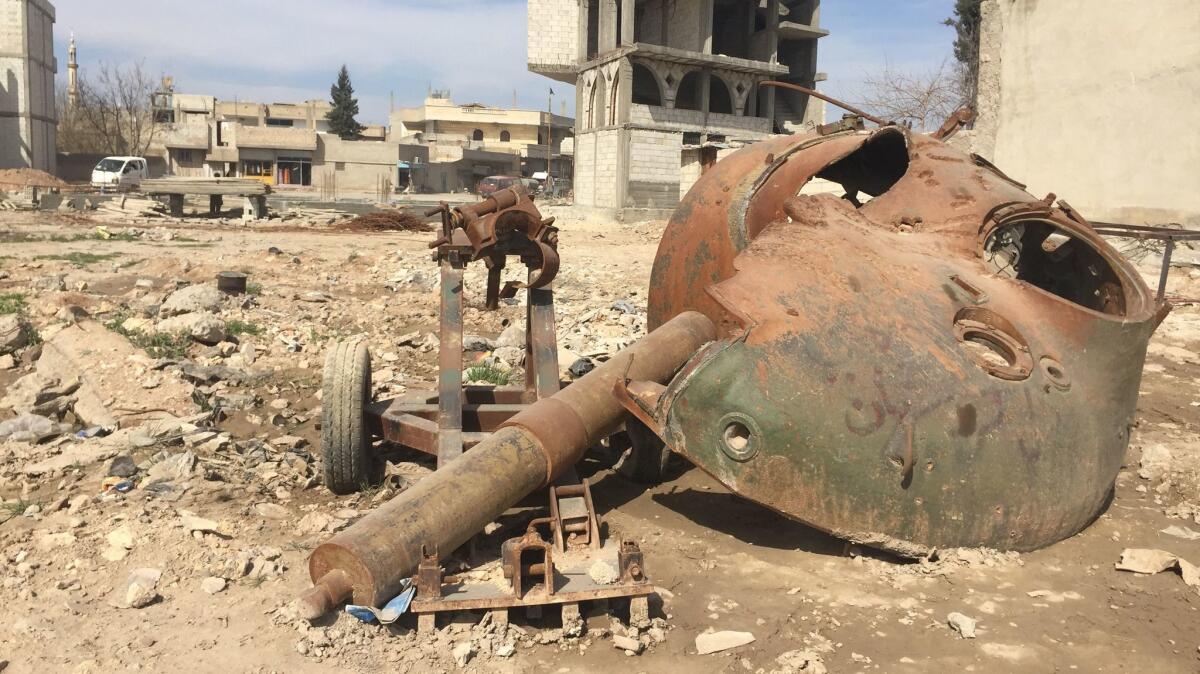Column: Trump may actually win the war against Islamic State

- Share via
While Washington has been absorbed in battles over healthcare and incipient scandals, a real war is escalating sharply in Syria and Iraq: the one against Islamic State.
Without much public notice, thousands of U.S. combat troops are back on the ground in the Middle East: roughly 7000 in Iraq, almost 1000 in Syria, another 2500 in Kuwait.
Those troops aren’t only special operations forces; they include artillery teams fighting in Iraq and a helicopter unit that has flown behind Islamic State lines in Syria.
U.S. airstrikes have intensified, too, and civilian casualties have spiked dramatically since the beginning of the year. As many as 200 civilians may have been killed in Mosul last week; the Pentagon says it’s investigating.
U.S. combat troops are back on the ground in the Middle East: roughly 7000 in Iraq, almost 1000 in Syria, another 2500 in Kuwait.
The death toll is a tragedy. But it’s also a grim sign that the long offensive against Islamic State, begun by President Obama in 2014, is moving rapidly toward success — and for that, President Trump deserves some credit.
Under Obama, who waged a “light footprint” strategy with minimal U.S. troops, Islamic State lost most of the territory it once held in Iraq and almost a third of what it held in Syria.
But taking the extremist group’s most important strongholds, Mosul in Iraq and Raqqah in Syria, was taking longer.
Enter Trump. The new president, after claiming he had a secret plan to win the war, told his generals to give him one in 30 days. They responded with an outline — a “skeleton plan,” in the words of Defense Secretary James N. Mattis – that could be described as Obama Plus: more bombing, more troops, fewer restrictions on commanders.
“The Obama strategy wasn’t failing, but it was slow,” James F. Jeffrey, a former ambassador (and former Army officer) who’s advising the administration, told me. “This is more — not only more troops, but more willingness to use them. It’s a change of maybe 20%, but it’s an important 20%.”
Paradoxically, the success of those changes comes with its own danger: the peril of “catastrophic success,” a phrase military officials use to describe the 2003 invasion of Iraq. That experience taught a lesson: Conquering territory doesn’t guarantee that a war will stay won. So Trump administration officials are quietly planning for an open-ended commitment of U.S. troops to both Iraq and Syria for “stabilization operations” after Islamic State is defeated. And that may well require more American troops, not fewer.
In Iraq, stabilization means persuading the government in Baghdad, which told U.S. forces to leave in 2010, to let them stay longer.
In Syria, where the U.S. doesn’t want to cooperate with the government of President Bashar Assad, it means setting up an interim administration of local leaders under the protection of U.S. and allied troops.
A State Department official said stabilization means “making sure people can come back to their homes, there’s a security apparatus in place that’s locally based, there’s a local government in place.”
In Jeffrey’s view, it also means a continued effort to negotiate the Assad regime out of power. “If the Assad regime remains in power, you’ll just get another [Islamic State],” he said.
It all sounds expensive, ambitious and not quite in keeping with Trump’s campaign promise to take the U.S. “out of the nation-building business.”
That may be one reason officials take pains to say their goals are limited.
“Stabilization … is very distinct from long-term reconstruction, long-term nation-building,” a State Department official said.
Eventually, officials say, they hope the oil-rich countries of the Persian Gulf will pay to rebuild Syria and Iraq.
Good luck with that. Other countries aren’t likely to pony up — and the effort isn’t likely to succeed — unless the United States is involved too.
One more dilemma: To make stabilization work, Trump is going to have to spend money on the State Department and foreign aid agencies whose budget he wants to cut. (That’s not just my civilian opinion; Mattis says that every time he appears before Congress.)
It all sounds a lot more complicated than the strategy Trump suggested in his campaign.
“I would bomb the … out of them,” he said then, using profanity. “I’d blow up every single inch. There would be nothing left. And you know what? You’ll get Exxon to come in there, and in two months … they’ll rebuild it brand new.”
“And I’ll take the oil,” he added.
It won’t be anywhere near that simple — or that rewarding — but if Trump listens to Mattis he might just achieve a goal that eluded his predecessor: pacifying Iraq and Syria.
Twitter: @DoyleMcManus
Follow the Opinion section on Twitter @latimesopinion or Facebook
MORE FROM OPINION
I lost my seat in Congress because I voted for Obamacare. I don’t regret that decision at all
Trump’s public broadcasting cuts will zero out live, local, real news
Are we subsidizing a public health crisis by allowing the poor to buy soda with food stamps?
More to Read
A cure for the common opinion
Get thought-provoking perspectives with our weekly newsletter.
You may occasionally receive promotional content from the Los Angeles Times.







